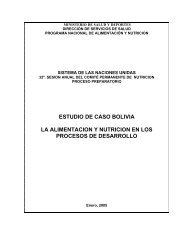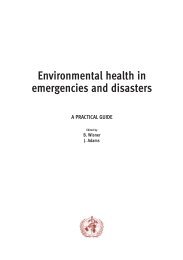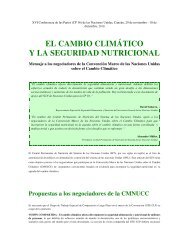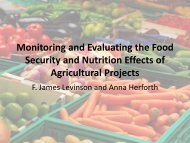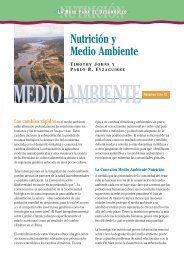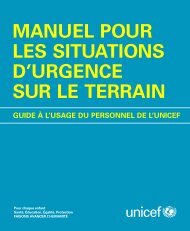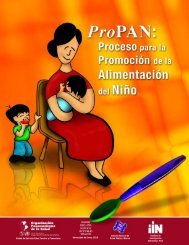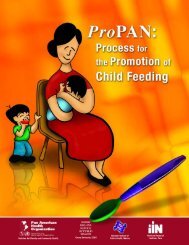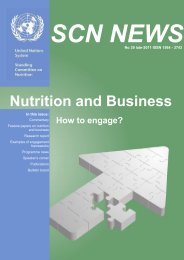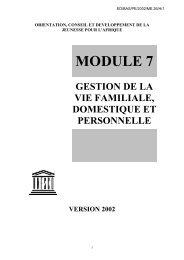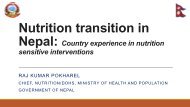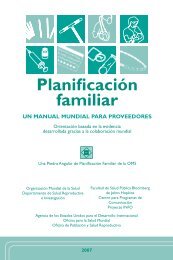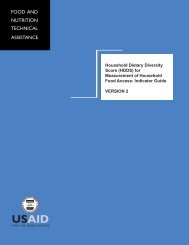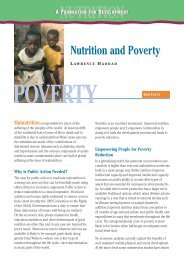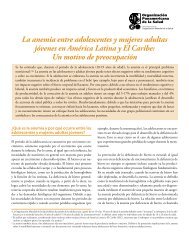SCN News No 36 - UNSCN
SCN News No 36 - UNSCN
SCN News No 36 - UNSCN
You also want an ePaper? Increase the reach of your titles
YUMPU automatically turns print PDFs into web optimized ePapers that Google loves.
www.unsystem.org/scn PROGRAMME NEWS 69<br />
Optional Protocol on ICESCR<br />
FIAN<br />
Good news for the children, women and men who are hungry, malnourished, ill, or who do not have access to clean<br />
water, sanitation, education and other ESC rights due to national and international public policy actions or omissions.<br />
The UN Human Rights Council - in a historical decision – approved by consensus on June 18th, the Optional Protocol<br />
for the International Covenant on Economic, Social and Cultural Rights (ICESCR). The most important step was taken<br />
towards the establishment of an international recourse mechanism for the investigation and redress of violations of the<br />
IESCER. Once approved by the UN General Assembly, economic, social and cultural rights will finally have equal standing<br />
with civil and political rights in face of the International Human Rights System.<br />
The Optional protocol is the result of several decades of work by governments, civil society , experts and UN human rights<br />
bodies. The ICESCR was one the few major human rights treaties which did not count with a mechanism for the presentation<br />
of petitions related to violations. An intergovernmental working group had been working on the draft since 2004.<br />
With the adoption of the Protocol, governments recognize the competence of the UN Committee on Economic, Social and Cultural<br />
rights to receive and investigate communications of violations from individuals and groups; to request the governments to<br />
adopt urgent cautionary measures to avoid further and irreparable damage to victims of potential violations; to investigate claims<br />
of serious and systematic violations received from reliable sources, related to ESC rights. The text of the protocol establishes as<br />
well that States should guarantee that individuals presenting such claims are not harassed or intimidate from presenting them.<br />
The entry in force of the Protocol, in the year that the Universal Declaration of Human Rights completes 60 years, is an<br />
important step towards the effective incorporation of the Human Rights paradigm into economic and development policy.<br />
Individuals and groups, affected by violation of any of the rights included in the Covenant, will be able to hold their governments<br />
accountable, as well as the international community, towards the effective realization of these rights. The full<br />
implementation of the Protocol will certainly strengthen the push for more participation, transparency, public accountability,<br />
policy coherence and adequate budget allocation, with the participatory establishment of goals, benchmarks and<br />
timelines, suitable for adequate public monitoring of the implementation and impact of public policies on the realization<br />
of ESC rights for all, in special traditional excluded and discriminated against individuals, groups and communities.<br />
Contact: valente@fian.org<br />
PMNCH<br />
Countdown to 2015 Conference 17-19 April, Cape Town<br />
The mission of the Countdown to 2015 for maternal, newborn and child survival is to track progress made towards the<br />
achievement of the United Nations Millennium Development Goals 1, 4 and 5 in 68 Countdown priority countries and<br />
promote evidence-based information for better health investments and decisions by policy-makers regarding health<br />
needs at the county level.<br />
The second Countdown to 2015 Conference was held in Cape Town, South Africa from 17-19 April 2008 in conjunction<br />
with the 118th Assembly of the Inter-Parliamentary Union (IPU). One of the highlights of the Conference was the Countdown/IPU<br />
Special Session in which a delegation of IPU parliamentarians actively participated, together with 14 Ministers<br />
and country delegations from 61 out of 68 Countdown priority countries. The special session was an advocacy exercise<br />
to sensitize IPU parliamentarians and all participants to maternal, newborn and child survival and to have them take action<br />
in their countries to reach the goals for MDGs 1, 4 and 5.<br />
Nutrition was among topics discussed at the Countdown to 2015 Conference, as reflected in a presentation by Dr Robert<br />
Black of John Hopkins University on the findings and key messages from the Lancet Nutrition Series (see full agenda<br />
with presentation material here) as well as in the final Statement of commitment concerning maternal, newborn and child<br />
survival. This statement takes note that "adequate nutrition, and food security, water and sanitation should be a priority<br />
at all levels and in particular at the family level, given their strong relationship to overall health, productivity and ultimately<br />
to social and economic development". In "affirming that the achievement of the MDGs must be based on a strong<br />
commitment of all governments, organizations, and partners to protecting the human rights of women, children and adolescents",<br />
the Ministers, parliamentarians and all participants present at the Countdown to 2015 Conference committed<br />
themselves to "an intensive effort to:<br />
• Sustain and expand successful efforts to achieve high and equitable coverage of effective and high-impact interventions<br />
that save lives and improve the health of mothers and children, and thereby contribute to the fight against poverty;<br />
• Integrate efforts to address undernutrition with broader maternal and child health strategies;<br />
• Support initiatives to stop early marriage, early childbirth and harmful practices, to keep adolescent girls in schools<br />
and to promote good health-seeking behaviour among them;<br />
• Strengthen primary health care, linked to the achievement of measurable results;<br />
• Invest in strengthening health systems, including efforts to improve the quality, accessibility, affordability and coverage<br />
of essential health services, with a particular focus on priority periods within the continuum of care and strengthening<br />
links with interventions addressing HIV/AIDS;<br />
• Invest in infrastructure development and human resources in relation to ethical recruitment and training of health<br />
workers, particularly skilled attendants, at all levels, assuring a committed and motivated health workforce;<br />
• Allocate more resources to research, monitoring and evaluation for maternal,<br />
back to contents <strong>SCN</strong> NEWS # <strong>36</strong>



